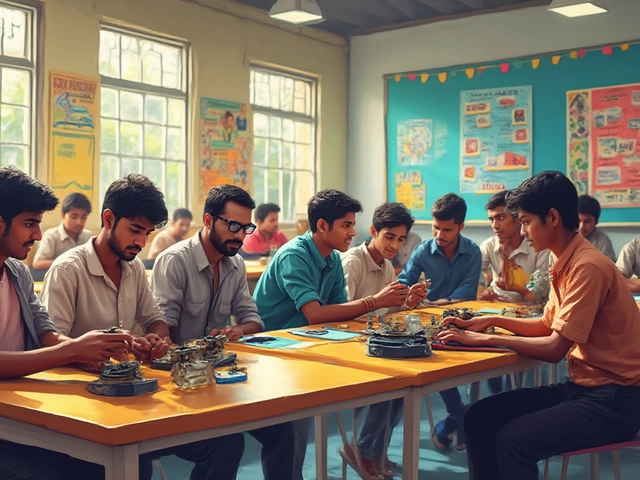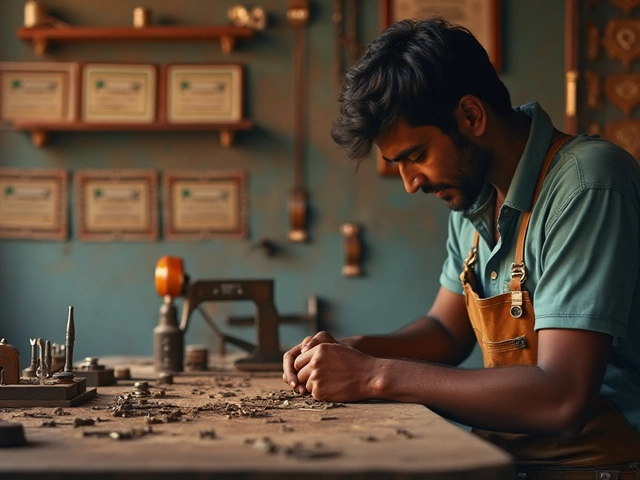Every year, lakhs of ambitious students throw themselves at a challenge that’s left even some geniuses scratching their heads. Ask anyone about India’s toughest academic hurdle, and most won’t even pause: it’s the fabled IIT Joint Entrance Examination, better known as the IIT JEE. While stories swirl around grueling workloads in medical and chartered accountancy streams, nothing quite matches the fierce reputation of this exam. The country treats the JEE almost like a rite of passage—conquer it, and you make it to the Indian Institutes of Technology, arguably the most coveted tech schools in Asia. Miss it, and parents, neighbors, even distant relatives seem to feel it in their bones.
The Real Face of the IIT JEE: Why It's So Brutal
So what’s so monstrous about this notorious exam? First, the numbers feel unreal. Each year, over 1.5 million teenagers register, but less than 2% actually bag a seat at one of the few IITs. The syllabi run miles ahead of the standard school curriculum: if regular CBSE Physics feels tough, JEE questions throw in curveballs that demand out-of-the-box thinking, memory, speed, and, above all, a certain mental stamina you just can't fake. Unlike most university entrance exams, the IIT JEE doesn’t just check if you can memorize formulas. It’s designed to trip you up, test if you really ‘get’ the core principles, and spot your weaknesses. Trick questions, never-seen-before sums, a time crunch—these are standard fare.
Let’s tear down some myths. You don’t need to be born a genius to crack the JEE. What you do need is a relentless grind. The ‘average’ topper spends 6-8 hours a day solving, re-solving, and sometimes just staring at physics problems until the logic clicks. That’s on top of regular school. Think high school was draining? JEE aspirants juggle rigorous coaching (online, in-person, or sometimes both), thick stacks of theory books, dozens of mock tests, and a daily pressure cooker of expectations from, well, just about everyone they know. Even the social scene changes—birthdays, movies, and cricket matches are just quick breaks between mock test marathons.
Which brings up the mental part. Sure, mastering calculus or electrostatics is tough. But keeping your nerves steady week after week, month after month? That’s the part that cracks most students. Stories abound of kids peaking too early, burning out, losing their edge by the time the actual exam rolls around. Some call it a test of knowledge, but most toppers say it’s a test of patience and resilience. Everything about the process—from the cut-throat competition to the all-or-nothing atmosphere—contributes to making the IIT JEE the toughest beast in the Indian academic jungle.
Other Challengers for India’s Toughest Course
Of course, the IIT JEE isn’t the only exam that’s stacked with horror stories. AIIMS and NEET have their own legion of sleepless aspirants. Becoming a doctor in India is no cakewalk; the MBBS entrance exams select fewer than one out of fifty applicants. Then, there’s the UPSC Civil Services Exam, with its sprawling syllabus covering history, polity, current affairs, ethics, and more. Chartering through CA, or Chartered Accountancy, means surviving three stages of mind-numbing complexity, with pass rates that dip into single digits.
Each of these paths brings distinct challenges. Medical entrance tests expect encyclopedic memory and relentless practice for biology, in addition to physics and chemistry. UPSC, on the other hand, is notorious for the sheer breadth of its syllabus; it’s so vast that even seasoned professionals struggle to cover all bases. For CA, the real monster usually lies in the second stage: a single paper might send almost 90% of students back for another try. Yet, in sheer numbers, intensity, and reputation, the IIT JEE often sits at the very top.
Still, let’s not ignore other quietly brutal courses like architecture (NATA), national law schools (CLAT), NDA for the armed forces, and even design entrance tests for places like NID and NIFT. What ties all these paths together isn’t just a hard exam, but months (often years) of sustained effort, razor-sharp focus, and sheer grit. But you’d struggle to find another exam where coaching centers have turned into a multibillion-dollar business, or where success literally transforms social status overnight, like the India's toughest course—the JEE.

Inside the Life of a JEE Aspirant: What It Really Takes
Imagine setting an alarm for 4 a.m., grabbing a quick bite, and digging into yet another set of integration problems before sunrise. For lakhs of students, that’s just daily routine through their JEE prep years. Coaching classes aren’t just buildings—they’re all-consuming communities where lectures go on for hours, doubt-clearing sessions stretch late into the night, and instant feedback is both a blessing and a curse. Some of India’s biggest cities, like Kota and Hyderabad, are now infamous for their coaching factory model—students move away from families, live in hostels or cramped PGs, and train intensely just like sports professionals.
Parents and teachers aren’t the only ones setting the bar sky-high—peer competition amps up the pressure even more. One slip, one bad test, and the sense of losing out can get overwhelming. Don’t even start about revision marathons leading up to the main exam—entire months feel like a blur of mock tests, performance graphs, and nervous WhatsApp discussions about tricky chemistry ‘exceptions’. While some thrive under this pressure, it’s not unheard of for mental health to take a real hit—so much so that popular coaching hubs now have full-time counselors.
Here’s a bit many guides miss: it’s not always about studying longer but smarter. Top scorers swear by organizing daily schedules, breaking everything down into bite-size revision cycles, and learning to ‘fail fast’—spotting weak topics early enough to fix them, not waiting until the last month. They use question banks, but also older JEE papers to get a real taste of the unpredictability. And they lean on each other—study groups, even online communities, offer encouragement when the going gets brutal.
There’s also the importance of switching off. Coaches now encourage students to pick up short bursts of exercise, short walks, or even meditation drills to keep burnout at bay. Many success stories start with a mistake or a bad year—repeat candidates outnumber freshers in the ranks of JEE toppers. So yeah, resilience really is king. Hanging in there through months of physical exhaustion, self-doubt, and social isolation is the hidden exam within the exam.
Surviving and Succeeding: Tips for Future Aspirants
First off, start early—but don’t panic. Nothing wrecks your confidence faster than trying to sprint through two years’ worth of math in the last three months. Break up your preparations: focus on understanding the fundamental concepts, and not just memorizing formulas. Lots of candidates claim what helped most was a revision notebook for quick reference and constant self-testing through quizzes and timed mini-mocks, not just full-length tests.
If you can, rope in a good mentor or coach who knows how to break down nerve-wracking problems into chewable chunks. But don’t fall for factory approaches—what worked for your friend might not work for you. Customize your study plan after a dry run of sample papers; you’ll quickly figure out which topics are your kryptonite. Make your own notes, even if the book already looks ‘comprehensive’. The act of writing reinforces memory better than passive reading or watching video lectures.
Balance helps, big time. Set aside time for hobbies or outlets—a few minutes of a game, music, or just sleep. The top cause of silly exam mistakes is fatigue, not ignorance. As much as planning matters, so does flexibility; leave room for bad days and recover quickly from setbacks. Use group study to quiz each other, but don’t turn it into a comparison contest or a source of anxiety.
And yeah, don’t treat every mock test like the World Cup final. Feedback is just info; use it to get better, not to ruin your next day. Remember, the top scorers on D-day are often those who learned from repeated failure. Finally, keep your eyes open outside the textbook. JEE rewards lateral thinking and a real knack for problem-solving, sometimes from casual day-to-day experiences.
At the end of the race, cracking India’s toughest entrance exam doesn’t make you superhuman, and not getting through doesn’t make you a failure. But pitching yourself against this test will teach you discipline, persistence, and, maybe most importantly, how to survive India’s wild academic ride. And if nothing else, you’ll have stories to tell—ones that everyone, from your next-door aunty to your future boss, will want to hear about.





Write a comment